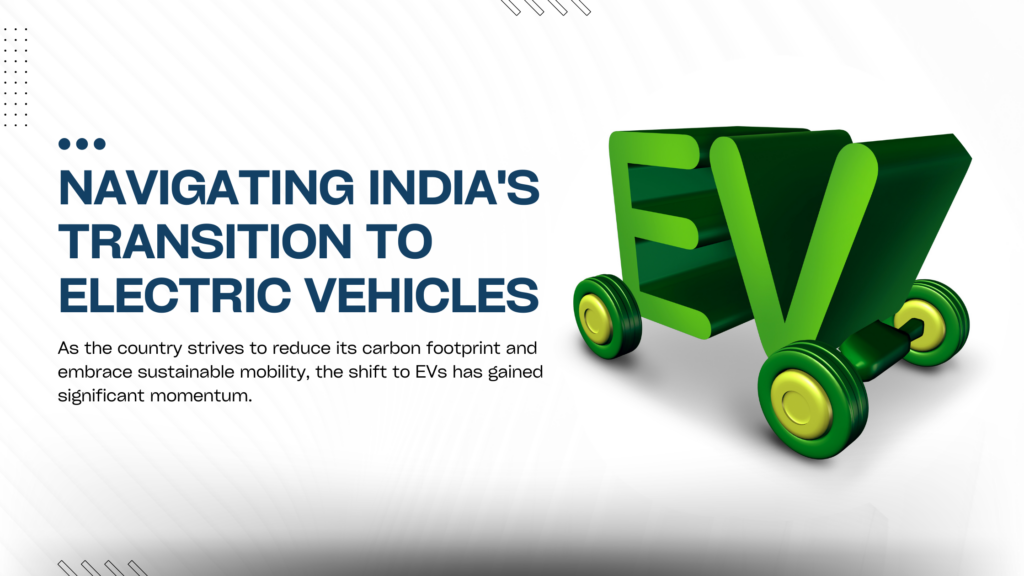Navigating India’s Transition to Electric Vehicles
 India’s journey toward electric vehicles (EVs) is both exciting and transformative. As the country strives to reduce its carbon footprint and embrace sustainable mobility, the shift to EVs has gained significant momentum. However, this transition isn’t without its challenges. From infrastructure development to consumer adoption, several factors play a critical role in India’s path to a greener, electric future.
India’s journey toward electric vehicles (EVs) is both exciting and transformative. As the country strives to reduce its carbon footprint and embrace sustainable mobility, the shift to EVs has gained significant momentum. However, this transition isn’t without its challenges. From infrastructure development to consumer adoption, several factors play a critical role in India’s path to a greener, electric future.
The Growing Demand for Electric Vehicles
The demand for electric vehicles in India is on the rise. With increasing awareness of environmental issues and the need to reduce pollution, more people are considering EVs as a viable alternative to traditional fuel-powered vehicles. The government’s push towards cleaner energy, coupled with incentives like subsidies and tax benefits, has further fueled this demand.
However, the transition to electric vehicles isn’t just about replacing petrol or diesel engines with electric ones. It involves a comprehensive overhaul of the existing transportation ecosystem. Manufacturers need to innovate and create EVs that are not only affordable but also reliable and capable of meeting the diverse needs of Indian consumers.
Infrastructure: The Backbone of EV Adoption
One of the biggest challenges in the widespread adoption of electric vehicles in India is the development of infrastructure. Charging stations, in particular, are crucial for the success of EVs. Without a robust network of charging points, potential EV buyers may hesitate to make the switch due to range anxiety.
To address this, both the government and private players are investing heavily in setting up charging infrastructure across the country. Urban areas are seeing a rapid increase in the number of charging stations, but rural and semi-urban regions still lag. Ensuring that charging points are as ubiquitous as petrol stations is essential for a seamless transition to electric mobility.
Battery technology is another critical aspect of the infrastructure puzzle. The efficiency, cost, and longevity of batteries will determine the overall viability of EVs in India. Advances in battery technology, such as the development of fast-charging and long-range batteries, are crucial to making electric vehicles more appealing to the masses.
Overcoming Consumer Hesitations
Despite the benefits of electric vehicles, consumer hesitations remain a significant barrier to widespread adoption. Concerns about the range, charging time, and the initial cost of EVs are common among potential buyers. Additionally, the lack of widespread knowledge about EV maintenance and the resale value of electric cars adds to the skepticism.
Education and awareness campaigns are vital to overcoming these hurdles. Consumers need to be informed about the long-term savings and environmental benefits of owning an electric vehicle. Furthermore, as more people experience the convenience and performance of EVs, word-of-mouth will likely play a crucial role in changing perceptions.
Another way to address consumer concerns is through government policies that make EV ownership more attractive. Incentives such as reduced registration fees, road tax exemptions, and subsidized insurance can help tip the scales in favor of electric vehicles. Additionally, creating a secondary market for used EVs can alleviate concerns about resale value.
The Road Ahead: Collaboration and Innovation
India’s transition to electric vehicles is a complex and multi-faceted process that requires collaboration between various stakeholders. The government, automakers, technology providers, and consumers all have a role to play in ensuring a smooth and successful transition.
Innovation will be the key driver in this journey. From developing more efficient batteries to creating smart charging solutions and integrating renewable energy sources, the possibilities are endless. The future of electric vehicles in India looks promising, but it will require sustained effort and investment to overcome the challenges along the way.
In conclusion, while India’s shift towards electric vehicles is filled with challenges, it also presents tremendous opportunities. The country is at a crucial juncture where the choices made today will shape the future of transportation for generations to come. By navigating this transition with a clear vision and a collaborative spirit, India can lead the way in sustainable mobility and create a cleaner, greener future for all.
Click here to know more about (India EV Technology in 2024: Current Trends and Future Prospects)

Comment (1)
[…] Lightweight and compact motors are becoming increasingly popular across industries, particularly in electric vehicles (EVs), appliances, and industrial automation. These motors are designed to be smaller, while maintaining […]